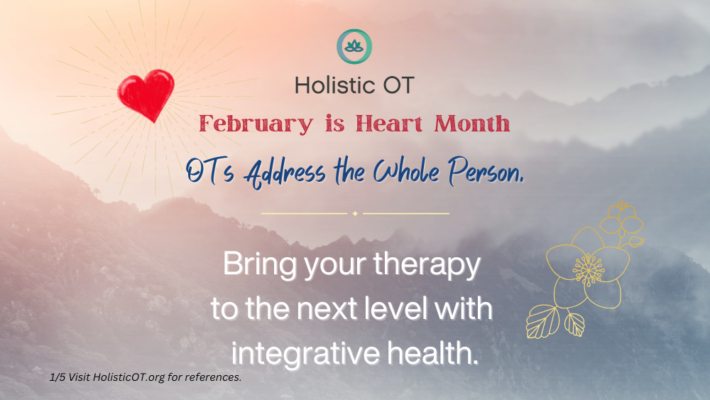
Heart Health and Holistic OT
Bring Your Therapy to the Next Level with Integrative Health
February is Heart Month, according to the American Heart Association, and when we celebrate Valentine’s Day. It is when we turn our attention to heart health, physically and emotionally.
OTs Address the Whole Person
Occupational therapists address the whole person, as a holistic profession. When it is combined with integrative health, there are further improvements a person can receive to enhance their outcomes, whether that be in a rehab, prevention, or wellness settings. There are several types of integrative health interventions that can be used in combination with OT to optimize health outcomes and improve functional ability. A few key ones are presented in this article related to heart health.
The Mind-Heart and Body and Interconnected
The whole person consists of the mind-body-spirt, an inseparable holistic system that impacts itself on all levels. A person is not just a body. For example, the heart is more than a physical object or pump. Furthermore, there are several integrative health approaches that can positively support the whole person for health, wellness, and prevention. (1)
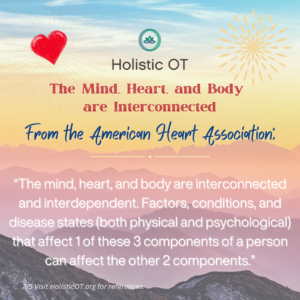
American Heart Association
There are good data that show clear correlations between psychological health and cardiovascular disease and risk. There is increasing evidence that psychological health may be causally linked to biological processes and behaviors that contribute to and cause cardiovascular disease. Interventions that improve psychological health can have a beneficial impact on heart health.(1)
“The mind, heart, and body are interconnected and interdependent. Factors, conditions, and disease states (both physical and psychological) that affect 1 of these 3 components of a person can affect the other 2 components.”
These examples provide how a person’s physical, psychological, and emotional heart can be supported to stay well and recover from or prevent disease. Thus, they can engage in meaningful activities with greater independence and interdependence within their home or family life, including adding to healthy ecosystem for the whole world.
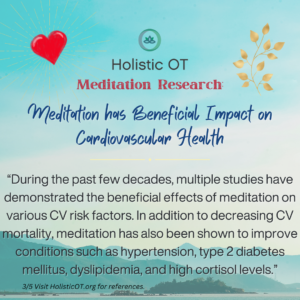
Meditation Research
In the past few decades, multiple studies have shown beneficial effects of meditation on various risk factors related to heart health. Meditation offers a variety of positive impacts on the mind-body-spirit, including lowering stress, anxiety, and pain.
Meditation research has shown to decrease cardiovascular mortality, and improve conditions, such as:
- hypertension
- type 2 diabetes mellitus
- improve dyslipidemia
- high cortisol levels (2)
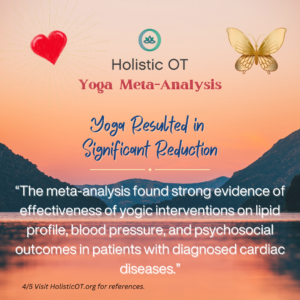
Yoga Resulted in Significant Reductions
Yoga is becoming more popular and has been practiced for thousands of years. Recently, it has shown several benefits for maintaining health, wellness, and prevention of illness and disease, according to research studies and personal experiences. Yoga may be practiced as form of a healthy lifestyle, and it has been integrated into therapy sessions to help people recover from physical and mental illness and disease.
A yoga meta-analysis found strong evidence of effectiveness of yogic interventions on:
- lipid profile
- blood pressure
- psychosocial outcomes in patients with diagnosed cardiac diseases (3)
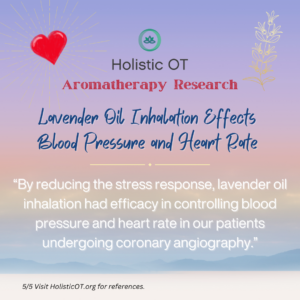
Aromatherapy Research
Aromatherapy is the art and science of utilizing naturally extracted aromatic plant essences known as essential oils to promote health and well-being.
Lavender oil inhalation resulted in hemodynamic parameters, such as systolic and diastolic blood pressures and heart rate being significantly reduced. Lavender oil aromatherapy reduced the stress response and had efficacy in controlling blood pressure and heart rate in patients undergoing coronary angiography. (4)
Many Types of Integrative Health Approaches
These are a few examples of integrative health approaches that can be used to improve heart health that can be used in occupational therapy practice. Many integrative health approaches can help people lower stress, anxiety, pain, and symptoms of trauma. They can support a person toward greater well-being. They have the potential to help people recover from and prevent disease and illness.
Most integrative health approaches can be taught by a skilled practitioner for a person to use in their life as part of health lifestyle and routine. In these cases, the integrative health approach is an occupation unto itself, in addition to being a therapeutic intervention. Furthermore, integrative health can be practiced by the practitioner for self-care and to prevent or recover from burnout, promoting greater satisfaction and longevity in their role as a health care provider.
When a person is more calm and less stressed they can connect more to their heart, love, and joy. Emotions can be more balanced and regulated creating greater resilience. They can develop compassion through mindful awareness. Thinking becomes more clear. Accessing intuition and inner wisdom becomes more effortless. Decision-making is simplified. Great confidence and self-esteem grows, all adding up to a more fulfilling and enriching life. (5)
(This article was originally conceived in images, with a summary of research, for a social media post to be seen as a slide show with each image numbered in the lower left corner.)
References
- Levine, G. N., Cohen, B. E., Commodore-Mensah, Y., Fleury, J., Huffman, J. C., Khalid, U., Labarthe, D. R., Lavretsky, H., Michos, E. D., Spatz, E. S., & Kubzansky, L. D. (2021). Psychological health, well-being, and the mind-heart-body connection: A scientific statement from the American Heart Association. Circulation, 143(10), e250–e274. https://doi.org/10.1161/CIR.000000000000094
2. Ray, I. B., Menezes, A. R., Malur, P., Hiltbold, A. E., Reilly, J. P., & Lavie, C. J. (2014). Meditation and coronary heart disease: A review of the current clinical evidence. Ochsner Journal, 14(4), 696–703.
3. Kalra, S., Miraj, M., Ajmera, P., Shaik, R. A., Seyam, M. K., Shawky, G. M., Alasiry, S. M., Mohamed, E. H., Alasiri, H. M., Alzhrani, M., Alanazi, A., Alqahtani, M., Shaikh, A. R., Al-Otaibi, M. L., Saleem, S., Pal, S., Jain, V., & Ahmad, F. (2022). Effects of yogic interventions on patients diagnosed with cardiac diseases: A systematic review and meta-analysis. Frontiers in Cardiovascular Medicine, 9. https://doi.org/10.3389/fcvm.2022.942740
4. Ziyaeifard, M., Azarfarin, R., Faritous, Z., Dehdashtian, E., Baghestani, A., Ziyaeifar, P., & Yousefi, Z. (2017). Evaluation of lavender oil inhalation effects on blood pressure and heart rate in patients undergoing coronary angiography. Iranian Heart Journal, 18(4), 29–33.
5. Vadnais, E. (2020). Intuitive Development: How to Trust Your Inner Knowing for Guidance with Relationships, Health, and Spirituality. St. Paul, MN: Emmy Vadnais





Leave a Reply